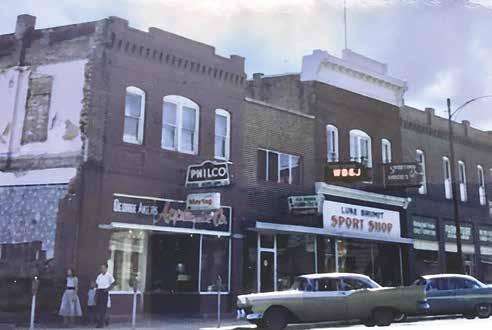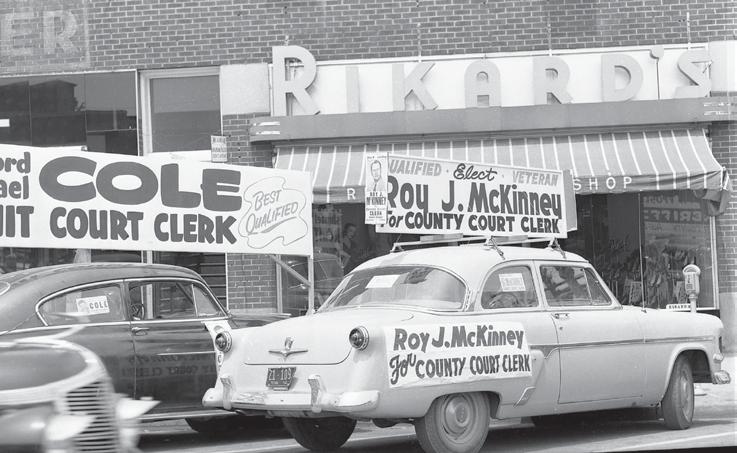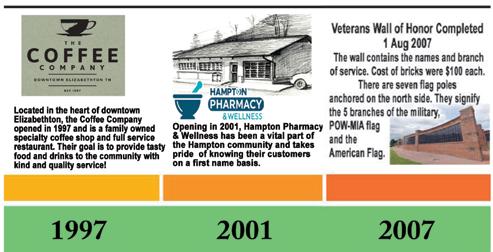Working on the Railroad in 1923 in Old Butler

Take a glimpse into the rich heritage of Carter County through contributed photographs, timeline and other historical memorabilia.

__ Proud to be a part of __ Carter County Heritage



Since 1934, Citizens Bank has continued to grow with the community. This year, the bank was able to secure approval for over $173 million in SBA PPP Loans for more than 2,000 small businesses. And, we are looking forward to the future!


Doe River Mill Race has its place in local history
BY ROZELLA HARDIN EDITORIAL DIRECTOR rozella.hardin@elizabethton.com“…Doot, doot doot lookin’ out my back door.”
“Lookin’ Out My Back Door” is a song recorded by the American band Credence Clearwater Revival. While the lyrics paint some vivid imaginary pictures, there are some interesting scenes and perhaps a bit of history in everyone’s backyard.
Out my back door is the Doe River Mill Race. I live in the Old Mill Stream Condos on Race Street, and if I look close enough I can see the concrete foundation of the old Doe River Overall Factory.
The Doe River Mill Race was a manmade waterway branching off of the Doe River which provided power to several of Elizabethton’s early industries including the Tennessee Chair Company, which was directly across Broad Street from the Watauga Flour Mill. The mill race has its beginning near the Covered Bridge and flows northward on the western side of the Edwards Island Park along Riverside Drive, and then it goes underground at the Broad Street Bridge, emerging from two large tiles on the condo property and flowing westward under a small bridge on Sycamore Street, continuing its journey down Race Street before its flows into the Watauga River under a small bridge at the end of the Elizabethton Linear Walking Trail on Race Street. Jenkins Mill was located near the trail’s end in the early 1900s and used water from the Doe River Mill Race for power.
Among those early small industries located on the Doe and Watauga rivers that used water for power were the Doe River Woolen Mill, which was located on the Watauga side of Race Street. It produced woolens, blankets, yarns, jeans, and socks, and reportedly employed some 40 people. Adjoining the mill was a commissary operated by D.E. Taylor.
And, there was a brick facility located between Race Street and the river, which was known as Captain Rhudy’s Brick Plant. But, right out my back door was where Power City Milling Company and the Doe River Overall Factory were located, and they, too, were powered by the Doe River Mill Race. Another business that operated briefly at
that location was Watauga Bottling Works. Originally, the Watauga Flour Mill, it was later known as the Power City Milling Company. The mill was located just north of the Broad Street and Sycamore Street intersection and was operated by J.R. Bowie of Roanoke, Va., from 1910 to 1938. The mill manufactured flour, meal, and feed. Bowie sold the meal to Bill Weber of Bluff City. Later owners were T.K. Griffith and N.B. Jackson.
The building was divided into two parts, housing a flour mill south of the mill race, and a pants factory on the north side. The pants factory was first operated by N.B. Jackson and later was owned by W.P. Dungan and L.H. Rudy. Known as the Island Pants Company, the business operated from 191014.

D.E. Taylor and his son, Burchell “B.R.” and Frank Dungan purchased the factory
around 1922. They operated under the name of Doe River Overall Company. Its produce, as the name implies, was overalls with the trade name of “Jobbers.” Hundreds of dozens of overalls and overall coats were manufactured yearly. At the height of its business, approximately 65 women were employed at the overall factory and worked under the supervision of Lee Broils. According to the Carter County History Book, some of the employees were Dot Ensor, Etta Pierce Grindstaff, Virgie Nidiffer, Alice Bowers, Ruth Garrison, a Miss Stout, and Victor Broyles, who was the cutter.
The overall factory operated up until the depression, when the WPA employed the factory to run government regulations, which were headed by Mrs. Carrie (B.R.) Taylor and Marguerite Clark Davis, who served as secretary. Commodities were distributed by the Tennessee Relief Agency among which were eggs, cornmeal, and grapefruit. Mrs. Taylor,
in an interview with the STAR several years ago, said some that received the food would take the grapefruits out of the boxes and bags and play ball with them. When they finished playing they would throw the grapefruits in the mill race. The waiting room of the building, where people registered for the food, was heated by a big “pot belly” stove.
Several federal funded programs were initiated at this location under the supervision of Mrs. Taylor.
The Power City Mill building — a threestory building — was destroyed by fire in December 1958. At the time, both it and the overall plant were owned by Verlin Frost, who acquired them in the early 1950s. He made flour at the mill, and used the overall plant as offices.
The old mill race still has water in it and trickles down Race Street, but few recognize its importance in the history of Elizabethton.
The Kyte Family

James Robertson and Daniel Boone were the first European explorers to come to Elizabethton, arriving in 1759
Settlers of northeast Ten nessee needed to establish some kind of law and order and organize defense against attacks. They met at Sycamore Shoals to fonn the Watauga Association in 1772.
1759


Today this is considered to be the first majority-rule American democracy/ 1772
The Watauga Association at Sycamore Shoals near Elizabethton drafted the first constitution ever written by white men in America in 1772. It was patte rned after the con stitution of the Iroquois League of Nations, a federal system of government devel• oped 200 years earlier for five eastern Native American

1772
Sinking Creek Baptist Church is the oldest church in Tennessee.
It was organized 1772 in Washington County (now Carter County) and is the oldest church in Tennessee still in existence at its original location.
1772
Hore. Nard,.19. 1775. et tho Syca•

..:!ff Si-II. tho •W•taucJ• As-S· .- Cllorlu �- Tnattec. "°"9ht• from the Clluokec. with Occi,oototo as C'lllef, lands olana the --· Holston and Great Cana- fnow Newl Riven. TIIC caadderetlon for the parcllueZOOO Paands Stwll119-
1775
Early during the American Revolutionary War, Fort Watauga at Sycamore Shoals was attacked in 1776 by Dragging Canoe and a warring group of Cherokees opposed to the Transylvania Purchase 1776
Keenburg students presented Operetta at school




The first four grades of Keenburg School presented the operetta “The Land of Dreams Come True” on Friday, May 11, 1951 at 7:30.

August 1979



February 22, 1963

Granny Febuary’s ghost has been around for almost a century
BY ROZELLA HARDIN EDITORIAL DIRECTOR rozella.hardin@elizabethton.com
Highland Cemetery on the southern outskirts of Elizabethton is one of Elizabethton’s most historic cemeteries. Some of the town’s earliest citizens and leaders are buried on the high hill overlooking Elizabethton. But, also lurking in the cemetery — especially around Halloween — is the ghost of Granny Febuary.
Local legend has it that Granny Febuary’s ghost lurks in the cemetery, and that if you go to her grave at midnight on Halloween, you will hear her rocking chair moving inside the mausoleum, where her remains are. Some say that she can be seen walking among the graves at night.

Granny Febuary stories have been told for years and she has been mentioned in para-
normal sites across the Internet. One story circulating says if you leave food at Granny Febuary’s mausoleum, she is likely to talk to you, and if the offering is particularly tasty, she will grant you a wish. Some old-timers contend Granny Febuary was a witch and had the gift of healing.
However, there are a few discrepancies in the Granny Febuary stories.
First of all, Granny Febuary is not buried in the mausoleum containing a rocking chair, and her real name is Nannie Crow Brister — a homemaker with a love for music.
According to most stories, Granny Febuary was born in 1888 and married Isaac T. Febuary. Apparently he died, leaving her a young widow. She later married Alvin Bert
GHOST

Crow, who died in 1923. She was described by many as being generous and some of the stories told by old-timers say her fingers were often stained from breaking open walnuts and digging in her flowerbeds. She is also said to have had a fondness for Cadillacs, even though it’s not known if she ever had one and it is doubtful that she ever drove one.
It is said that Granny Febuary often took shortcuts through Highland Cemetery, past the old African-American cemetery on Southside Road to get milk from a local dairy. From time to time, she would stop at her husband’s grave for a chat, leading the neighborhood children to believe she was a witch and could converse with the dead.
Granny Febuary died during the Great Depression — the marker on the mausoleum says she died Dec. 4, 1931, at the age of 43. Her coffin was placed next to her husband’s in the mausoleum, a small
cinderblock and concrete house at the back of the Highland Cemetery. The building is now old with cracks in the concrete mortar, and the doors chained and locked.
Legend has it that she loved rocking so much that her family placed a rocking chair in the mausoleum. It is the chair that many youngsters of more than half a century ago claimed to have seen rocking, especially at night. However, both the table and chair have been removed from the mausoleum because of vandals trying to break in.
Some stories have Granny Febuary having three lifeless experiences. Each time she was placed in a coffin and placed in the mausoleum, sometimes with food and drink, only to return from the dead each time.


The story goes that for many years after her eventual death, people placed food and fresh drink inside the mausoleum thinking that she might once again return from the dead. Some claim to hear her say “thank you” after they left the food and drink in the mausoleum. Others say she talked to them.


The late Bill Austin, a former Elizabethton STAR reporter, who last worked at the STAR in the 1990s, grew up near the Highland Cemetery. He often told stories from his childhood, when he and his friends would visit the cemetery at night to see if the stories about Granny Febuary were true. However, Austin said he could never be sure because they never stayed long enough to find out; once darkness descended upon the cemetery, there were all kinds of eerie and frightful sounds. Frightful enough to send them home in a hurry.
Although there is nothing to actually validate there was a real Granny Febuary, old-timers were sure of her ghostly presence.
However, if you are thinking of paying a visit to Granny Febuary’s mausoleum this Halloween, beware. In Tennessee, it is illegal to be in a cemetery after sunset unless you have family buried there. Some cemeteries do not allow anyone to be there after sunset — not even those seeking to learn the truth behind a local ghostly legend.

Backbone Rock in 1901

Old Stoney Creek Baptist Church



Paty Lumber Company











Cove Creek Community Church celebrates 100 years
BY ANGELA CUTRER ELIZABETHTON STARIt’s been 100 years since Cove Creek Community Church opened its doors in its present building on Cove Creek Road on Roan Mountain. And the church is looking forward to its next 100 years.

During a celebration Oct. 16, church members held a special service to commemorate the history of the church and give a charge for the future. Nearly 100 visitors — symbolically representing each year of the church’s anniversary — enjoyed a reception full of snacks, historical videos, photographs, exhibits and camaraderie.
“The event was such a great success,” said Lucas Hitechew, who is serving as interim pastor of the church. “It was nice to see the large turnout and hear the stories being told. There was a lot of warmth — both communally and religiously. Listening to them you realize just how big of an impact the church has had in the community.”
This particular celebration was specific to the building itself, which was built in 1922. Before that, the church was held in a private home first and afterward, a church-school combination building. The stone school in front of the building was built about 10 years after the church’s construction.
“I grew up further down [from the church] and there has always been a sense of community in this area,”

Hitechew added. “Cove Creek was one of the first churches built by all the communities in the holler coming together. After it was built, its members went to help other communities build their churches.”
The building has been expanded at least two times and it finally got its own steeple — with a little bell — around 2003. There have been 26 pastors — the longest tenure was 30 years by Dan Blevins.
The church sits in a community that is known for its caring servant leadership aspects, Hitechew said. “I’ve traveled here and there, and I’ve found
this church to be comforting and genuinely caring. It calls itself ‘Cove Creek’ because that is the reason for it being located here. When someone in Cove Creek is sick, needing food or just someone to care, this church takes care of each other. Its focus is very much on being there for each other and having a servant mindset. It’s very tight-knit.”
Hitechew, speaking for church members, said a big thank you to the community for being so supportive through the years. “These churches in the holler are indicative of how early churches were,” he said. “It feels like a small family, but even when visitors
come by, they became family, too.”
Hitechew said the 25-30 church members are now focusing on the church’s continuing legacy. “We are asking ourselves, what is our legacy? We know we want to be kind-hearted, accepting and caring to everyone.”
But there is still the No. 1 reason why the church exists at all: “None of this [celebration] is about us — it’s about God’s providence, God’s love and care, and we give him all the glory,” Hitechew explained. “He needs to be the one who lifts us.
“The celebration was to God for his blessings.”












Walgreen in the late 40s early 50s





Pal’s Sudden Service





Working on the Railroad in 1923 in Old Butler








1924 Cyclones


Left to right: Wayne Ritts, Folsom Elliott, Harry Ritts, Orville Jones and Bill Tomcray.
Second row: Edward Nims, Robert Kane, Howard Campbell, Earl Ryan, Harold Brumitt, and Louis Wetzel, manager.

Third row: Professor C.A. Kyte, Coach, Davis Sherrill, Wade Snodgrass, Horace Clark, Luthur Haynes, Fred Slagle, Ben Rhudy, and Ray Lovelace, trainer.
1977 Softball
1977 Topper Egg softball

Softball






Softball Teams





Lane Hills School only Basketball Team












